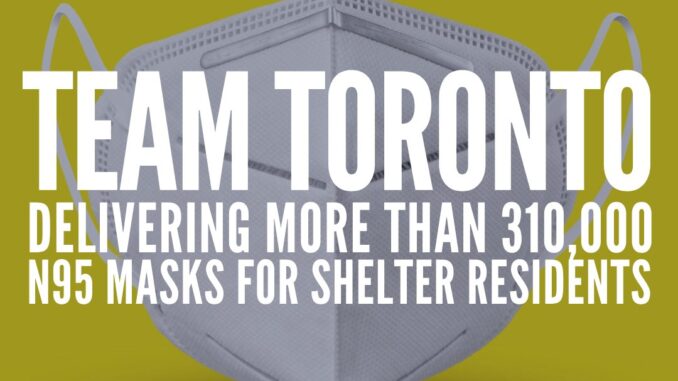
The City of Toronto continues to work around the clock to respond to the increasing demands on the shelter system created by the ongoing COVID-19 pandemic’s Omicron surge and extreme cold weather by preparing to open new shelter spaces in two community centres. As well, all shelter sites will soon receive deliveries of more than 310,000 N95 masks to make available to shelter clients.
N95 masks are now recommended by many health experts to best protect against spread of the highly contagious Omicron variant. The City estimates the more than 310,000 N95 masks will be sufficient to provide all clients of the shelter system with N95 masks for at least the next 14 days. This new order, with initial deliveries expected to begin in coming days, will add to the City’s supply of PPE in shelters sites, including more than 213,000 N95 masks for shelter staff and clients, 188,000 surgical masks and more than 121,000 rapid antigen tests (RAT) for the system.
As well, in coming days, the City will open two community centres creating additional emergency shelter space to help those experiencing homelessness get out from the cold. Toronto has the largest shelter system in Canada, currently providing space for more than 7,200 individuals. The system is composed of 75 permanent shelters and 24-hour respite sites. As part of the City’s response to COVID-19, the City is also currently operating 26 temporary sites to create physical distancing in the shelter system and provide space for people to move indoors from encampments. These new contingency spaces at community centres will offer a safe and welcoming place for emergency shelter, meals, and help connecting to important wrap-around supports like mental and physical health care. The City will share further details about these openings when spaces are ready for clients.
Shelter, Support and Housing Administration (SSHA) is continually working with partners to explore options to add additional space for those in need, while also balancing the availability of staff and other required supports to ensure the safe and effective operation of sites. The City will redeploy staff when needed, to ensure essential and critical City services are maintained.
Throughout the pandemic, the City of Toronto has prioritized the health and safety of people experiencing homelessness in shelters and outdoor settings and continue to do so, especially now, in light of the Omicron variant.
From employing physical distancing, to rigorous infection prevention and control (IPAC) measures, providing access to masks for clients and staff, and activating ongoing vaccination clinics, the City continues to take a comprehensive approach to mitigate the impacts of COVID-19 on the shelter system and people experiencing homelessness.
As well, investments in initiatives to improve ventilation, such as higher-quality HVAC filters or portable air filters at City-funded shelters, 24-hour respites and drop-ins have also been a priority. The City has provided more than 440 portable HEPA filters for use at shelter sites across the city. An additional 220 HEPA filters are being delivered this month.
The City’s commitment to ensuring the safety of people experiencing homelessness remains unwavering. This includes continuing to maintain and expand shelter spaces for people to move indoors, as well as stringent IPAC measures that have been applied in the shelter system throughout the pandemic, and will continue to be applied at all sites, including any site opened temporarily to create contingency capacity.
The best defense to maintaining a safe environment within shelters and the broader community is ensuring as many people as possible are fully vaccinated. Toronto Public Health (TPH) mobile vaccine clinics are held at shelters, 24-hour respite sites and 24-hour women’s drop-ins seven days a week. The City also continues to work with Inner City Health Associates to hold vaccination clinics onsite. For the month of January, there are 154 COVID-19 vaccination clinics scheduled to help ensure people experiencing homelessness get vaccinated. As of January 7, 2022, 76 per cent of those aged 12 and above currently staying in the shelter system have received their first dose, 65 per cent have received their second dose, and 13 per cent have received their third dose. Thirty per cent of those aged 5 to 11 have received their first dose.
For more information about Toronto’s response to the COVID-19 pandemic in the shelter system, visit www.toronto.ca/community-peopl
Quotes:
“Throughout the pandemic, the City of Toronto has prioritized the health and safety of people experiencing homelessness living in shelters and outdoor settings and will continue to do so, especially now, in light of the Omicron variant. We have seen the speed at which the variant can spread, and one of the places that I have been most concerned about and most focused on having daily updates on, is the shelter system. From employing physical distancing, to rigorous infection prevention and control measures, providing access to masks for clients and staff, and activating ongoing vaccination clinics, the City continues to take a comprehensive approach to mitigate the impacts of COVID-19 on the shelter system and people experiencing homelessness. The frontline staff who provide services in the shelter system are dedicated professionals who continue to deliver services, and, working collectively with our health partners, will continue to ensure the stability of the system as they have throughout the pandemic to protect vulnerable people experiencing homelessness. I want to sincerely thank all City staff and homelessness sector partners for their continued commitment, dedication and efforts as we all continue to work to protect the health and safety of our most vulnerable fellow citizens.”
– Mayor John Tory
“People experiencing homelessness are some of the most vulnerable residents in our city and we must do everything possible to ensure they are protected during this wave of the pandemic. At the City of Toronto, we will continue to prioritize vaccination opportunities, operationalize additional capacity, and increase access to personal protective equipment for those experiencing homelessness.”
– Councillor Joe Cressy, (Spadina-Fort York), Chair of the Toronto Board of Health
SOURCE City of Toronto

Leave a Reply